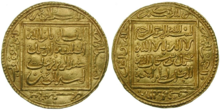Abu Yaqub Yusuf I.
Abu Yaqub Yusuf I ibn Abd al-Mu'min ( Arabic أبو يعقوب يوسف بن عبد المؤمن, DMG Abū Yaʿqūb Yūsuf b. ʿAbd al-Muʾmin ; † 1184 near Évora ) was the second caliph of the Almohads (1163–1184).
biography
Abu Yaqub Yusuf I was in the mountains of the High Atlas in Tinmal (also Tinmallal ), the son of Abd al-Moomin born and came maternal from Masmuda - Berbers from. As governor of Seville , he got to know the Andalusian culture early on . After his older brother Muhammad was overthrown in 1163, Yusuf I prevailed as the successor to Abd al-Moomin. The resistance of his younger brothers, who were governors in Cordoba , Fez and Bourgie, was overcome.
Rebellions in the Rif Mountains and in Gafsa also had to be put down, and the mercenary leader Qaraqush in Tripolitania had to be fought, who had invaded the Almohad Empire from Egypt with his troops. With the submission of Valencia in 1172, the rule of the Almohads in Andalusia could be secured for further years. Yusuf I. even married a daughter of his opponent Ibn Mardanish . In the following battles against the Christian kingdoms of northern Spain, Yusuf I was able to operate quite successfully, but not achieve any decisive success, since he avoided battles.
Abu Yaqub Yusuf I was wounded in a campaign against Lisbon in front of Santarém in 1184 and died from his injuries at Évora . He was buried in Tinmal next to Ibn Tumart and Abd al-Mu'min . He was succeeded by his son Yaʿqūb al-Mansūr (r. 1184–1199).
Culture
At the court of Abu Yaqub Yusuf, Ibn Tufail and Ibn Ruschd / Averroes, two of the most important philosophers in the Islamic world lived for a time, but they were banned or placed under house arrest for many years and no longer created any works. However, there was lively building activity in the empire, with Andalusian influences prevailing over Syrian-Egyptian - especially in the architecture.
literature
- Ulrich Haarmann : History of the Arab World. Edited by Heinz Halm. 4th revised and expanded edition. CH Beck, Munich 2001, ISBN 3-406-47486-1 , ( Beck's historical library ).
- Stephan Ronart, Nandy Ronart: Lexicon of the Arab World. A historical-political reference work. Artemis Verlag, Zurich et al. 1972, ISBN 3-7608-0138-2 .
| personal data | |
|---|---|
| SURNAME | Abu Yaqub Yusuf I. |
| ALTERNATIVE NAMES | Abu Yakub Yusuf ibn Abd al-Mu'min al-Shahid (full name); Aben Jacob (Latin); Yusuf I. |
| BRIEF DESCRIPTION | second caliph of the Almohads (1163–1184) |
| DATE OF BIRTH | 11th century or 12th century |
| DATE OF DEATH | 1184 |
| Place of death | at Évora |
